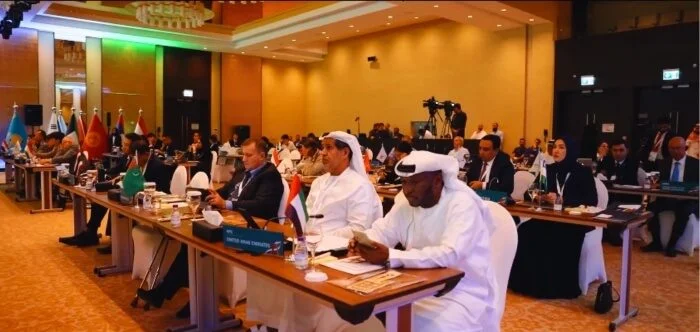Organizing a successful conference is a complex process that requires careful planning and efficient execution. It’s a journey that turns a simple idea into an eventful experience. But what exactly goes into this transformation? “What are the key elements to organize a conference?” is a question many event planners and organizations grapple with.
It lies in a series of strategic steps: defining clear objectives, choosing the right venue, securing knowledgeable speakers, establishing a realistic budget, and implementing effective marketing strategies.
Additionally, managing the logistics and ensuring attendee engagement are critical components. Each of these elements plays a vital role in the conference’s overall success. For a more in-depth look at these key elements, continue reading our comprehensive guide.
General Overview of Conferences
Conferences are dynamic platforms where ideas converge and innovation advances. They invite diverse professionals from various fields to exchange knowledge and insights. This joint effort of expertise encourages learning, networking, and collaboration.
Conferences focus on their role as hubs of knowledge exchange and professional development. Here, experts and enthusiasts gather to explore industry trends, share research findings, and discuss new technologies. This environment stimulates intellectual growth and encourages connections among like-minded individuals.
This focus could shift to the impact of conferences on industries and individual careers. These events often act as catalysts for new ideas and partnerships, driving advancements in numerous fields. Additionally, they offer outstanding opportunities for personal growth, allowing attendees to gain fresh perspectives and enhance their professional networks.
Popular Types of Conferences
Conferences are diverse events, each customized to specific goals and audiences. They range from academic gatherings to industry-specific forums, offering unique experiences. Attending or organizing the right one requires understanding their types.
Academic Conferences
In academic conferences, scholars and researchers present and discuss their latest findings. These events are crucial for sharing knowledge and advancing academic disciplines. Attendees benefit from exposure to the latest research and opportunities for scholarly collaboration. Such conferences often publish proceedings, contributing to the academic community’s body of work.
Trade Conferences
Trade conferences focus on specific industries, showcasing new products and services. They provide a platform for businesses to network, learn about market trends, and engage with potential clients. Attendees include industry professionals, vendors, and buyers, creating a dynamic business environment. These events are key for staying updated with industry advancements and forging business connections.
Professional Conferences
Professional conferences serve members of particular professions, offering continued education and networking opportunities. These events often feature workshops, keynote speakers, and panel discussions relevant to the profession. Attendees gain insights into best practices, regulatory changes, and industry innovations. Such gatherings are essential for professional development and maintaining industry standards.
Technology Conferences
Technology conferences are at the forefront of innovation, highlighting new tech advancements and applications. These events such as digital marketing conferences, cyber security conferences, etc. attract tech enthusiasts, developers, and industry leaders. They provide a glimpse into future technologies and their potential impacts on society. Attendees benefit from hands-on demonstrations, product launches, and networking with tech experts.
The diversity of conferences reflects the breadth of human knowledge and interests. From academic to technology-focused gatherings, each type offers unique benefits and experiences. Choosing the right type depends on one’s professional needs and interests, making each conference a unique journey of discovery and growth.
What are the Key Elements to Organize a Conference?
Organizing a conference requires careful planning and attention to detail. Whether you’re hosting a large or small event, organizing a successful conference involves setting clear goals, managing logistics, and ensuring effective communication. By focusing on these key elements, you can create an event that meets the needs of all participants.
Defining Financial Goals and Budget
Establishing financial goals and a budget is fundamental to conference planning. This step involves calculating expected costs, potential revenue sources, and setting a financial framework. It guides decision-making, ensuring that the event is both feasible and financially responsible. Effective budget management is crucial for the event’s overall success.
Choosing the Topic
The conference topic sets the tone and attracts attendees. It should be relevant, engaging, and reflect current trends or challenges in the field. A well-chosen topic not only draws interest but also establishes the event’s educational and professional value. This decision influences all subsequent planning stages.
Deciding on the Format
The conference format determines how content is delivered and how participants interact. Options include traditional presentations, workshops, panel discussions, or virtual sessions. This choice affects the overall attendee experience and engagement, making it a crucial aspect of planning. The format should align with the event’s objectives and audience expectations.
Setting Registration Fees
Determining registration fees is a balance between covering costs and ensuring accessibility. Fees should reflect the conference’s value while being affordable to the target audience. This decision impacts attendance numbers and overall revenue, making it a critical financial consideration. Appropriate pricing is key to attracting a diverse group of participants.
Creating an Event Planning Team
A skilled event planning team is essential for organizing a successful conference. This team coordinates all aspects of the event, from logistics to content. Their expertise ensures that each element is thoroughly planned and executed. A strong team is the backbone of a successful conference.
Working with a Professional Conference Organizer (PCO)
Deciding whether to collaborate with a PCO can significantly impact the conference’s success. PCOs bring expertise in event management, potentially enhancing the event’s quality and efficiency. This decision depends on the team’s experience and the event’s complexity. A PCO can be a valuable asset for large or intricate conferences.
Choosing the Date, Venue, and Location
Selecting the right date, venue, and location is critical for maximizing attendance and satisfaction. The venue should accommodate the event’s size and format, while the location affects accessibility and appeal. The date should consider potential conflicts with other events and attendee availability. These choices greatly influence the event’s success.
Creating Sponsorship Packages
Sponsorship packages can provide additional funding and enhance the event’s profile. These packages should offer value to sponsors while aligning with the event’s theme and audience. Effective sponsorship strategies can elevate the conference, providing financial support and adding prestige.
Starting Marketing the Event
Effective marketing is key to attracting attendees and building excitement. Marketing strategies should target the right audience, highlighting the event’s unique value proposition. This phase involves promoting the event through various channels, including social media, email campaigns, and industry partnerships. Strategic marketing is essential for a successful turnout.
Setting up the Event Website
The event website is a central information hub and the first point of contact for potential attendees. It should be user-friendly, informative, and visually appealing. The website plays a crucial role in marketing, registration, and providing attendees with essential information. A well-designed website enhances the overall experience and accessibility of the event.
Opening Registrations
Launching registrations marks the start of attendee commitment. The process should be streamlined, secure, and user-friendly. Early bird and tiered pricing strategies can encourage early sign-ups. Efficient registration management is crucial for a smooth attendee experience and accurate planning.
Each element in organizing a conference is interconnected and vital for its success. From financial planning to effective marketing, these components work together to create an impactful and memorable event. Attention to detail in each aspect ensures a conference that not only meets but exceeds expectations.
Factors to Keep in Mind While Organizing a Conference
Organizing a conference requires careful planning and attention to detail. The role of a conference organizer involves managing logistics, coordinating speakers, and ensuring a smooth experience for attendees. Below are some key factors to keep in mind while organizing a conference.
- Audience Targeting: Identifying and understanding your target audience is crucial for customizing the conference content. This ensures that the event meets the expectations and interests of the attendees.
- Budget Management: Effective budgeting is essential for covering all costs without compromising the quality of the conference. It involves prudent allocation of resources and cost control measures.
- Venue Selection: The venue should align with the event’s scale, accessibility, and ambiance. A suitable location can significantly enhance the attendee experience and engagement.
- Speaker Line-up: Securing knowledgeable and engaging speakers is key to delivering valuable content. Their expertise and presentation skills can greatly impact the conference’s success.
- Technology Integration: Making the most of technology for registration, presentations, and engagement tools enriches the conference experience. It simplifies processes and enhances interaction among participants.
- Marketing Strategy: A well marketing plan is essential to reach potential attendees and create buzz. It involves using various channels to promote the event effectively.
- Logistics Management: Efficient handling of logistics, from catering to transportation, ensures a smooth conference flow. Attention to detail in logistics prevents potential disruptions and enhances comfort.
- Sponsorship Acquisition: Gaining sponsors can provide additional resources and glorify the conference’s profile. It’s important to offer value and align with sponsors’ objectives.
- Feedback Mechanisms: Implementing feedback channels helps gauge attendee satisfaction and gather insights for future improvements. This feedback is vital for the continuous enhancement of conference quality.
- Contingency Planning: Preparing for unforeseen circumstances with backup plans ensures the event’s resilience. It’s important to anticipate potential challenges and have strategies in place.
Organizing a successful conference involves a careful consideration of various factors, from audience engagement to logistical execution. Each element plays a vital role in creating an event that is not only informative but also enjoyable for all participants. Mindful planning and execution of these factors can lead to a truly impactful and memorable conference.
Common Mistakes to Avoid While Organizing Conferences
Planning a conference involves many challenges, and even small oversights can lead to significant issues. Recognizing common pitfalls is essential for ensuring a successful event. Here we’ve highlighted typical mistakes to avoid during the planning and execution stages:
- Neglecting Audience Engagement: Focusing solely on content without considering attendee interaction can lead to disengagement. Engaging activities and interactive sessions are essential for a memorable conference experience.
- Underestimating Budget Needs: Inadequate budgeting often leads to last-minute financial crises. Accurate forecasting and contingency planning are key to financial stability.
- Overlooking Venue Logistics: Choosing a venue without considering logistics can create accessibility and comfort issues. Ensure the venue meets all practical requirements for attendees and speakers.
- Ignoring Technological Requirements: Failing to account for technical needs can disrupt presentations and communication. Adequate tech support and equipment are vital for a smooth conference.
- Inflexible Agenda Planning: An overly rigid agenda leaves no room for unexpected changes or delays. Flexibility in scheduling helps in accommodating unforeseen circumstances.
- Poor Communication Strategies: Ineffective communication with participants pre-event can lead to confusion and low turnout. Clear and frequent updates are crucial for informed and engaged attendees.
- Skipping Rehearsals and Checks: Not conducting technical rehearsals can result in avoidable glitches. Regular checks and rehearsals are essential for ensuring everything runs smoothly.
- Neglecting Post-Event Feedback: Failing to gather feedback post-event misses opportunities for improvement. Post-conference surveys provide valuable insights for future events.
While organizing a conference involves numerous challenges, being aware of common mistakes can greatly enhance the event’s success. Besides, anyone can reduce the chance of mistakes by utilizing organize a conference checklist effectively and consistently. By systematically addressing each item on the checklist, you can ensure that no detail is missed and that the event runs smoothly.
Wrap Up
An essential element of successful conference planning can be summed up by asking, “What are the key elements to organize a conference?”. Accurate and thorough planning is paramount, from establishing financial goals to effectively managing logistics. From defining clear objectives to effectively managing logistics, everything needs to be taken into consideration.
Each step, whether choosing a relevant topic, engaging the right speakers, or implementing effective marketing strategies, contributes significantly to the conference’s success. Equally crucial is avoiding common pitfalls such as neglecting audience engagement or underestimating budget needs.
These oversights can have substantial consequences, affecting the event’s immediate experience and long-term reputation. Thus, careful attention to detail and proactive management are vital in orchestrating a conference that is informative and engaging and leaves a lasting positive impression on its participants.








